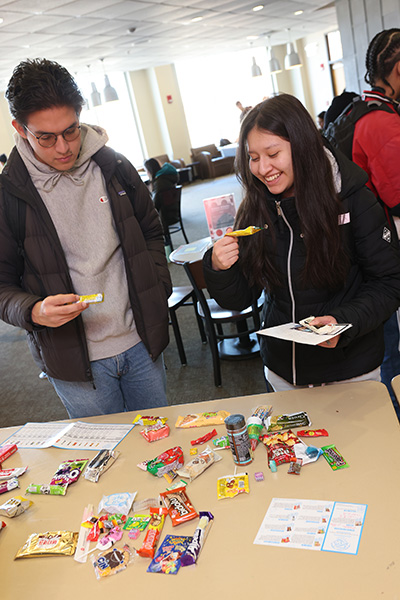- Apply
- Visit
- Request Info
- Give
Language matters: Eastern celebrates International Mother Language Day
Written by Marcus Grant
Published on February 22, 2024

Students, professors and faculty gathered on Feb. 21 to celebrate International Mother Language Day at Eastern Connecticut State University. Together, all were able to appreciate the many languages present on campus and learn some phrases in new languages.
Many packed in to play “What do you think this really means?” The game was meant to help students understand the complexities that come with translations, as many phrases don’t translate directly into English. One example from the game was “balet elbahr,” which means “go tile the ocean” in Arabic. The idiom is used as an expression to say, “I don’t care” or “go waste your time elsewhere” — much like the English expression “beating a dead horse.”
"Language is the foundation for us to understand each other," said Joshua Sumrell, coordinator of the Intercultural Center. "The more we can do that as a community, the better we can start to grow together."
Linguistics Professor Manuel Otero emphasized Sumrell's sentiments. "Language is intricately tied to our individual and collective identities. It is part of what makes us human and shapes our cultures," he said. "Being able to celebrate our languages and to learn about the rich diversity found across the world’s languages fosters cross-cultural conversations that I believe are at the core of a liberal arts institution like Eastern."
The event included many games from different cultures for students to play with one another. “Kalaney Belaney,” or (translated) “black elephant, white elephant” originates from India. “El Juego de la Oca” or (translated) “the game of the goose,” has a complex history with debated origins in Italy or Spain.
Sweets and snacks from other countries were displayed for attendees to look through, including Fresquitos from Spain, Tiki-Takis from Poland and Coco-Cajeta Rolls from Mexico.
Computer science Professor Sarah Tasneem, who organized the event said, "(International Mother Language Day) has the potential to provide students with a platform where they can discuss and share their diverse backgrounds, fostering a sense of acceptance within the broader community."
Feb. 21 was declared International Mother Language Day by the UNESCO in 1999. The name for the celebration was drawn from the commemoration of “Bhasha Dibosh” or “Language Day” in Bangla. In pamphlets given out to attendees, the important history behind the holiday was explained.
After British colonizers left India in 1947, Pakistan was split into two wings — the east was composed of predominantly Bangla speakers while the west predominantly spoke Urdu and other languages. Despite most of the combined Pakistani population speaking Bangla, the government named Urdu as the official language.
To protest the linguistic oppression of the government, activists and students in East Pakistan protested. Many were shot and killed by the police despite their use of peaceful protests. The pamphlet said, “All they had was their strong voices. Their collective voice against injustice; their collective voice to uphold the dignity of their mother tongue.”
In 1956, Bangla was recognized as the second official language of Pakistan. The Bangla language movement sparked another, pushing for the independence of eastern Pakistan. In 1971, Eastern Pakistan became the country now known as Bangladesh.
The international celebration promotes community and diversity among people of all cultures and languages. It is a day where all can “reflect on their origins with pride and dignity, fostering a sense of joy and contentment,” said the pamphlet.


